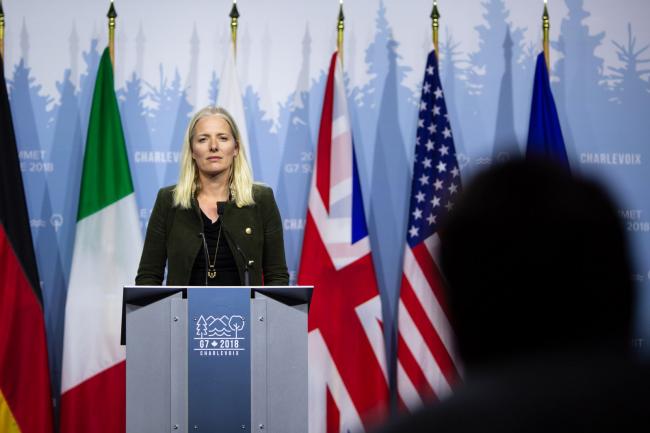Articles Menu

The federal government should publish its full review of fossil fuel subsidies as it works toward phasing them out, says an Ottawa-based corporate watchdog.
Environment and Climate Change Canada is currently poring over all federal non-tax measures that support the oil and gas industry, as it prepares to deliver on a climate-friendly G20 promise to eliminate the "inefficient" ones by 2025.
"I think it’s important for the public to know how much money Canadians are providing in support to fossil fuel companies," said Karen Hamilton of @AboveGroundNGO. #cdnpoli #climatechange #cdnecon
Earlier this week, the department said it would decide later how much of that review would be made public, but after a line of questioning from National Observer, a spokeswoman clarified that the full document is "expected to be made public."
"As part of the peer review process, both the self-review report and the peer review report from the peer review panel on Canada's progress to fulfill the G20 commitment are expected to be made public," Christelle Chartrand wrote in emailed comments on Tuesday morning.
The results of that review, the department told National Observer, will inform a peer review agreement recently reached with Argentina. Natural Resources Minister Jim Carr was in the South American country last week, where each party agreed to conduct a study on how much the other country subsidizes the fossil fuel industry.
Chartrand's original response to National Observer's request for clarification on whether the Canadian review would be published said that decision would not be made until the department had finished its self-evaluation.
"Next steps, including public reporting, will be determined once Canada has completed its review as per the G20 commitment and finalized details of the international review with Argentina," she wrote.
Above Ground, a non-profit that aims to improve corporate accountability and access to justice in Canada, received a similar noncommittal answer when it pressed the department earlier this month.
According to the Office of the Auditor General, "a subsidy is a financial benefit given by government to support taxpayers." In the case of the fossil fuel industry, this may include special tax deductions or reduced property taxes for oil and gas producers and consumers, or non-tax measures such as government grants and contributions.
As it stands, the federal government hands out hundreds of millions of dollars in tax-based subsidies to the oil and gas industry, through a handful of credit programs such as the Canadian Development Expense, the Canadian Exploration Expense, the Deep Drilling Credit and the Atlantic Investment Tax Credit.
Lesser known however, are the federal goverment's non-tax measures, which also include "government loans or loan guarantees at favourable rates, resources sold by government at below-market rates, research and development funding, and government intervention in markets to lower prices."
Environment Canada's initial uncertainty about publishing its complete review of such financial supports had raised a red flag at Above Ground, which argues that Canadians have the right to review how the federal government delivers its climate change promises, including the pledge to phase out inefficient fossil fuel subsidies.
"I think it’s important for the public to know how much money Canadians are providing in support to fossil fuel companies, whether that’s through tax or non-tax subsidies," program officer Karen Hamilton told National Observer in an interview.
Above Ground is particularly concerned that any subsidies provided by Export Development Canada, the country's federal credit agency, would remain shrouded if parts, or all of the review were kept secret.

Export Development Canada (EDC) helps Canadian companies extend their international reach by providing insurance, financing and guarantees to banks. It operates at arm’s length from the federal government, but ultimately reports to Parliament through the minister of international trade.
Last year, the credit agency helped facilitate $10.4 billion in exports in the oil and gas sector, representing 10 per cent of all exports and international investments it facilitated that year. It is also the largest financier of clean technology in Canada.
In March, International Trade Minister François-Philippe Champagne assured Above Ground in a letter that EDC "has been included" as part of the government's review of non-tax subsidies provided to the fossil fuel industry, which includes everything from digging up coal to shipping crude oil through a pipeline.
According to EDC, it "does not provide subsidies," as it operates commercially and is committed to market-based pricing. The agency is also confident that under the government's review, its support for the oil and gas sector would not qualify for the phase-out.
"Although we wouldn’t want to speculate on the results (of the review), EDC is confident that our support will not be considered 'inefficient' given our commitments to market-based pricing and the international commitments that EDC and the Government of Canada hold at the WTO (World Trade Organization) and OECD (Organisation for Economic Co-operation and Development)," wrote EDCspokeswoman Shelley MacLean in an emailed statement.
The International Trade Department has not clarified whether in the course of its review, it has determined whether EDC's support for the oil and gas industry qualifies as a non-tax subsidy, or whether it is "inefficient." It redirected media requests on the subject to Environment and Climate Change Canada, which in the past, has redirected requests about EDC to the International Trade Department.
Above Ground, which also noted that the government has not clarified what it considers "inefficient" either, said a number of arguments could be made that EDC's loans, guarantees and other financial supports for the industry are indeed subsidies.
"There’s a benefit provided through this financing that is different from going to a regular bank," Hamilton explained. "That's one argument. But then there’s also the other argument that this isn’t just a regular bank providing financial support. This is through the Government of Canada, through Canada’s export credit agency.
"In that case the other argument is that the support has, to a certain extent, government endorsement that goes beyond the dollar value, and that that government endorsement needs to be taken into consideration."
All Above Ground asks, added Hamilton, is that the government review the Crown corporation's support for the sector thoroughly, and publish those results, so that the Canadian public may keep abreast of the ways their dollars prop up oil and gas.

The spotlight on Environment Canada's publishing question comes after a series of criticisms of Canada's progress on the promise to kick inefficient fossil fuel support to the curb.
Last year, a scathing auditor general report found that Ottawa had not yet developed a strategy to phase out the inefficient subsidies by 2025, despite making the initial promise in 2009, placing it in the mandate letters of both the environment and finance ministers in 2015, and reaffirming it again in 2016.
The auditor general, Michael Ferguson, also noted that the Finance Department had refused to share information about how the government was keeping its promise to phase out the subsidies.
A few months later, in October, federal MPs held a secret meeting about fossil fuel subsidies, prompting an environmentalist, Annie Bérubé from Équiterre, to accuse Prime Minister Justin Trudeau's Liberals of trying to prevent politicians from studying the issue.
Last month, a dozen of Canada's most well known and influential environment groups also flagged lack of action on fossil fuel subsidies in a report card on the government's efforts to deliver on its environmental promises.
Earlier this month, Canada fared poorly in a report ranking the progress of the G7 nations on phasing out fossil fuels. The report, completed by Oil Change International and the International Institute for Sustainable Development, concluded that the seven biggest developed economies in the world collectively contribute more than $100 billion a year to help the fossil fuel industry.
While the U.S. spent the most overall, Canada spent the most per capita of any G7 country on oil and gas production, according to the report.
Canada also received a poor grade for transparency about its subsidies.
Environment Canada was not able to provide an expected completion date for its self-review of non-tax fossil fuel subsidies.
— with files from The Canadian Press
[Top photo: Environment and Climate Change Minister Catherine McKenna speaks with reporters at the G7 summit in Charlevoix, Que. on June 8, 2018. Photo by Alex Tétreault]